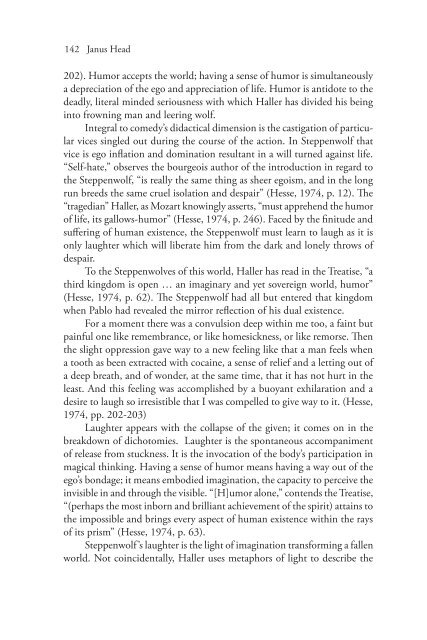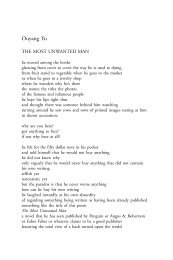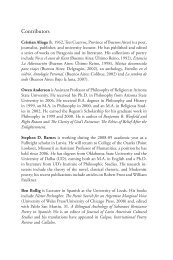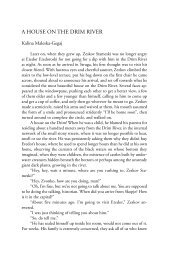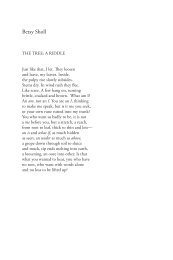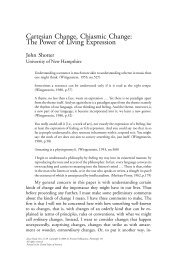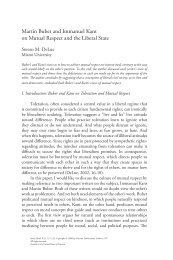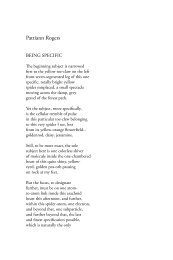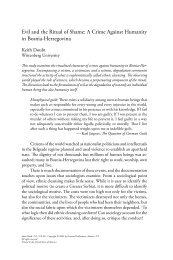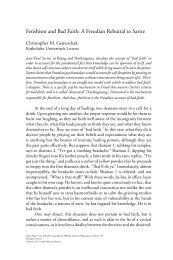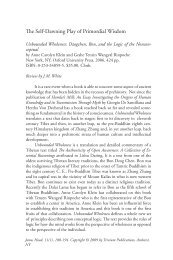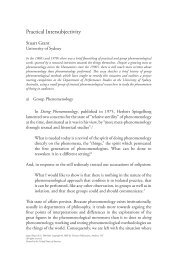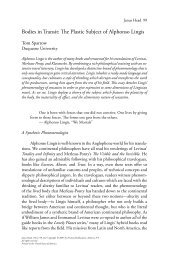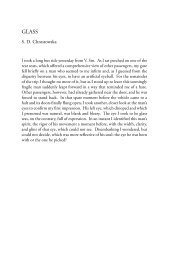Hesse's Steppenwolf: A Comic-Psychological ... - Janus Head
Hesse's Steppenwolf: A Comic-Psychological ... - Janus Head
Hesse's Steppenwolf: A Comic-Psychological ... - Janus Head
Create successful ePaper yourself
Turn your PDF publications into a flip-book with our unique Google optimized e-Paper software.
142 <strong>Janus</strong> <strong>Head</strong><br />
202). Humor accepts the world; having a sense of humor is simultaneously<br />
a depreciation of the ego and appreciation of life. Humor is antidote to the<br />
deadly, literal minded seriousness with which Haller has divided his being<br />
into frowning man and leering wolf.<br />
Integral to comedy’s didactical dimension is the castigation of particular<br />
vices singled out during the course of the action. In <strong>Steppenwolf</strong> that<br />
vice is ego inflation and domination resultant in a will turned against life.<br />
“Self-hate,” observes the bourgeois author of the introduction in regard to<br />
the <strong>Steppenwolf</strong>, “is really the same thing as sheer egoism, and in the long<br />
run breeds the same cruel isolation and despair” (Hesse, 1974, p. 12). �e<br />
“tragedian” Haller, as Mozart knowingly asserts, “must apprehend the humor<br />
of life, its gallows-humor” (Hesse, 1974, p. 246). Faced by the finitude and<br />
suffering of human existence, the <strong>Steppenwolf</strong> must learn to laugh as it is<br />
only laughter which will liberate him from the dark and lonely throws of<br />
despair.<br />
To the Steppenwolves of this world, Haller has read in the Treatise, “a<br />
third kingdom is open … an imaginary and yet sovereign world, humor”<br />
(Hesse, 1974, p. 62). �e <strong>Steppenwolf</strong> had all but entered that kingdom<br />
when Pablo had revealed the mirror reflection of his dual existence.<br />
For a moment there was a convulsion deep within me too, a faint but<br />
painful one like remembrance, or like homesickness, or like remorse. �en<br />
the slight oppression gave way to a new feeling like that a man feels when<br />
a tooth as been extracted with cocaine, a sense of relief and a letting out of<br />
a deep breath, and of wonder, at the same time, that it has not hurt in the<br />
least. And this feeling was accomplished by a buoyant exhilaration and a<br />
desire to laugh so irresistible that I was compelled to give way to it. (Hesse,<br />
1974, pp. 202-203)<br />
Laughter appears with the collapse of the given; it comes on in the<br />
breakdown of dichotomies. Laughter is the spontaneous accompaniment<br />
of release from stuckness. It is the invocation of the body’s participation in<br />
magical thinking. Having a sense of humor means having a way out of the<br />
ego’s bondage; it means embodied imagination, the capacity to perceive the<br />
invisible in and through the visible. “[H]umor alone,” contends the Treatise,<br />
“(perhaps the most inborn and brilliant achievement of the spirit) attains to<br />
the impossible and brings every aspect of human existence within the rays<br />
of its prism” (Hesse, 1974, p. 63).<br />
<strong>Steppenwolf</strong>’s laughter is the light of imagination transforming a fallen<br />
world. Not coincidentally, Haller uses metaphors of light to describe the


